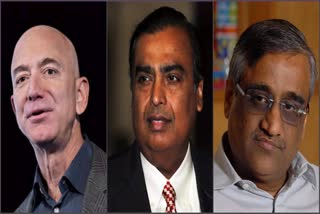Business Desk, ETV Bharat: E-commerce giant Amazon.com Inc. surprised the industry watchers on Sunday when it managed to get the deal stalled between the Future Group and Reliance Industries Ltd’s retail unit.
Amazon said that it has won an interim relief from the Singapore arbitration court, which has restrained Kishore Biyani’s Future Group from selling its retail and wholesale assets to Mukesh Ambani’s Reliance Retail Ventures Ltd (RRVL) for Rs 24,713 crore.
The deal between Future Retail, which owns the Big Bazaar chain of supermarkets, and RRVL would have given India’s biggest conglomerate RIL a major control over India’s retail market. In return, Future Retail would have been able to manage its acute debt and cash shortage problems. But Amazon has now clearly become a big roadblock for both these firms. Here’s a look at why exactly Amazon is opposing this deal and what gives it the power to do so.
The Amazon-Future Group deal signed in 2019
At the heart of the matter is the deal signed between Amazon and Future Group in December 2019, just a few months before Biyani signed the deal with RIL.
Amazon that time acquired a 49% stake in Future Coupons Pvt. Ltd (FCPL) for Rs 1,430 crore, which gave it an almost 5% indirect stake in Future Retail Ltd.
But, more importantly, it gave Amazon the ‘first right to refuse’ in case Future Retail decides to sell further stake in the firm in the coming years.
Amazon also says that the deal had a non-compete clause that restricted Future Retail from selling its retail assets to anyone on a “restricted persons” list, which included firms from the RIL group.
Read more:FM sees GDP growth in negative zone or near zero in current fiscal
The Future Retail-RIL deal
In August 2020, after the coronavirus pandemic hit Future Retail hard with stores shut across the country for months during the lockdown, Biyani struck a deal with Ambani to save the business and survive.
The importance of the deal can be gazed from that fact that Future Retail Ltd reportedly told the Singapore court during arbitration proceedings that it would have to go into liquidation if its deal to sell assets to RIL fails.
But Amazon argues it was not kept in the loop as far as the Future-RIL deal is concerned and the transaction cannot go ahead without Amazon’s approval in view of the non-compete clause in its deal with Future.
